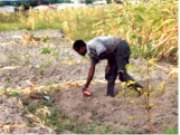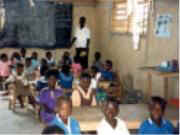Welcome to the
Third Way NGO
Return
to our Home page
![]() NEW!
nederlands
NEW!
nederlands
 |
 |
 |

|
| Human Rights through Micro-credit and finance, Education and Communication. | |||
|
Welcome to the
Third Way NGO
| ||||||||
What does Human Rights mean?
Broadly speaking Human Rights fall into three categories: 1. Civil and Political Rights (first generation rights). These are liberty-orientated and include the rights to: life, liberty and security of the individual; freedom from torture and slavery; political participation; freedom of opinions, expression, conscience and religion; freedom of association and assembly. 2. Economic and Social Rights (second generation rights). These are ‘security-orientated’ rights, for example the right to: work, education, a reasonable standard of living, food, shelter and health care amongst others. 3. Environmental, Cultural and Developmental Rights (third generation rights). These are the rights to live in an environment that is clean and protected from destruction, and rights to cultural, political and economic development. The
declaration of the Universal Declaration of Human Rights (UDHR) in
1948 gave legal status to the Human Rights. More often than not, people think of Human Rights in a very restricted manner. It is now important that from the traditional focus on political rights, we now conceive of human rights also in their economic, social and cultural dimensions. Fortunately, the 4th Republican Constitution of Ghana gives full expression to these in chapters 5 and 6, which deal with fundamental human rights and freedom, and the directive principles of state policy, respectively. More especially the rights of women, children, the aged and the disabled are given special emphasis. These would seem to suggest that economic, social and cultural rights are of equal weight and should be accorded as much attention as we give to political rights. But
are the domestic and international environments and attitudes
conducive to achieve this? NO. Results
of Ghanaian situation: low income, worsened situation for women,
migration, criminality, poor education, lack of employment
opportunities etc. We
define Human Rights Education as follows: all kinds of education
including training, dissemination of information and efforts aimed at
the universal realisation of human rights. Awareness, promotion and
provision of material supports towards achieving and enjoying those
rights. Main
principals: 1. construct Human Rights Education contents and methods from the context of learners 2. holistic and indivisable concept of Human Rights 3. empower the people, especially the oppressed, and conscienticise the oppressor 4. learn from the reality of Human Rights violations 5. emphasize the participatory methodology for horizontal relationship Human Rights Centre sub-principals: - enable people to develop critical understanding of their life situation, of questioning the barriers and structures which prevent the partial or full enjoyments of their rights and freedom; - help in the process of value clarification as thinking people; the effects on such values as fairness, equality, justice etc.; - bring about attitutional changes of teaching tolerance among and between members of different ethnic and national groups; - promote attitudes of solidarity, e.g. helping people recognize the struggles of others both at home and abroad as our fellow beings seek to meet their needs and respond to violations of human rights anywherre; - effect behavioral change, bringing about action that reflects people’s respect for one another, e.g. men behaving in nonabusive ways towards women, goouvernment officials behaving respecfully towards citizens by honouring everyone’s human rights changing certain work habits which inhibits progress. All the three generations of rights could be put under the collective name ‘basic rights’. What are basic rights? These are the rights of the people to have the power, means and access to the basic resources necessary to enable them to participate in their society and to make positive changes in their lives. These basic rights could be listed as follows: a right to a home, clean water, enough to eat, a safe environment, protection from violence, equality of opportunity, a say in their future, on education, a likelihood and health care. The centre would aimed at promoting these rights which would lead to a reasonable standard of living. That is currently difficult as a result of the Ghanaian situation: low income, worsened situation for women, rural-urban migration, criminality, teenage pregnancy, prostitution, large school drop-outs, lack of employment opportunities, high health costs etc. As a result of the global recession of 1980’s, which unleashed very debilitating economic and social hardships on the developing coountries, coupled with the inadequacies of a structural adjustment and an economic recovery programme, the situation of the average Ghanaian citizen has worsened. This has affected the primary social institutions like education, health care, family-relations etc. to the extent that the social and economic order is almost in a state of disintegration. The very vulnerable persons such as women, children, the poor in general, bear the greatest brunt of this social and economic malaise and it is based on these that we are moved to adopt prevention and intervention strategies in partnership with whoever cares, to forestall further hardship. Results of the above: - the introduction of the SAP (Structural Adjustment Program, World Bank IMF) has let to unstable currency situation. Inflation which officially is put at 25% per annum but could be higher in reality - because of the weakness of the currency people, especially landlords, have decided to collect rents in dollars - the price of imported goods has risen sometimes 5 times in a year which is beyond the means of the ordinary people - women die at childbirth, not forgetting to mention the children who die as well - divorce rates have increased - increase in domestic violence against women. Considering the fact that even in Britain 1 out of 5 women still suffers domestic violence then one cannot underestimate the need for such a centre and the way we want to organise it to empower the people to live fuller lives. - as a result of the unemployment teenage pregnancy has increased in population not forgetting the risk of AIDS. The above enumerate factors have motivated us to go into this project of integrating Human Rights Education with credit assistance to the beneficiaries. The
groups which has no social rights are the poor, disabled, children,
women, unemployment men and women, a large number of the youth and
indeed all the people who have no shock absorbers to contain the harsh
realities of the economic restructuring. However our main attention
would be directed to the illiterates adults who need some Human Rights
Education as well as some starting capital to be able to make a
living. We should gradually be able to cover all segments of the
population when we have enough resources. Especially the young girls
at risk of teenage pregnancy and AIDS would be tackled if there is
sufficient funding. All
the developments and consequences enumerated above has called for the
re-appraisal of the traditional focus in Human Rights Education, which
has been mainly on the civil and political rights (first generation
rights) to new endeavours such as ours, by not only making the people
aware of their rights but also helping them to achieve these rights. The centre should engage in and promote education at all levels in the area of human rights, including awareness raising amongst the general public. Teachers, pupils, pastors, police, doctors, or all others who should have interest in working with or implementing human rights in their teaching or daily activities are welcome.
|
Send mail to aewall@yahoo.com with
questions or comments about this web site.
|